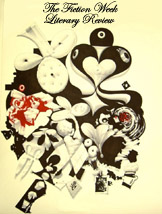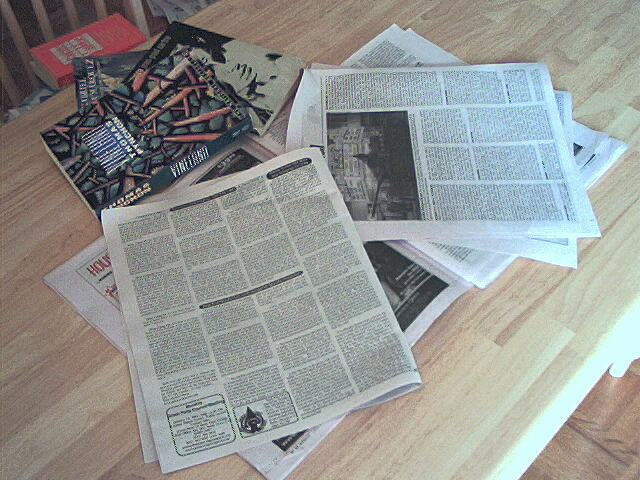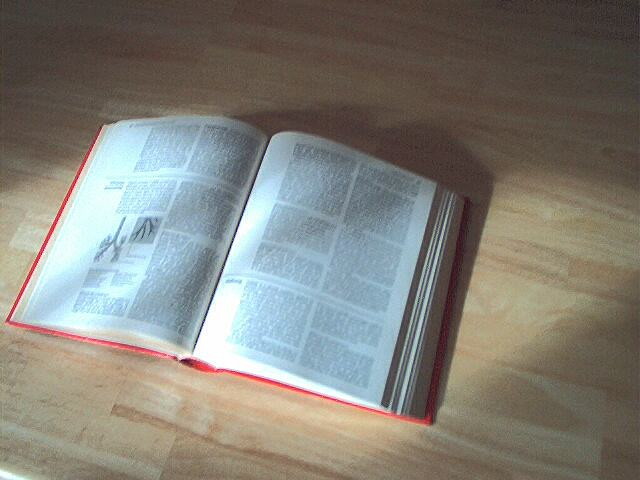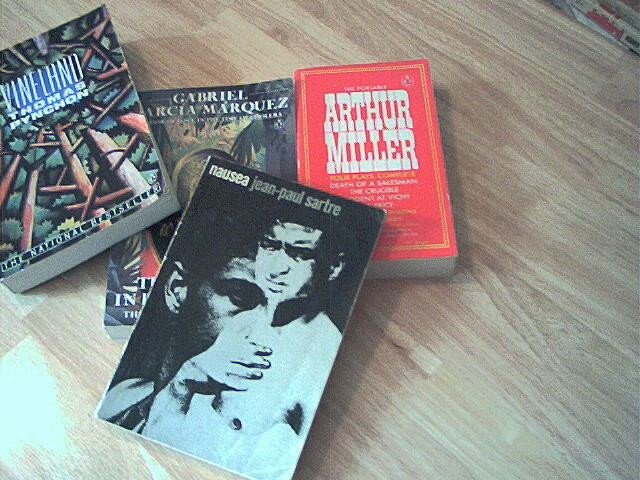ContentsEbooks
Writer's Forum Literary Agents Forum Current Events Discussions Fiction Discussions Agent and Editor Blogs Guide to US Writer's Groups Writing Conferences Writing Contests Internet Fiction Sites List Guidelines for Writer's Groups Writer's Group Discussions Running USA Runner's Forum Poetry Week About FictionWeek Site Map Contact Us Writers Wanted
Support this site by always using the Amazon.com search box below for all your Amazon purchases. FeaturesLiterary Agents On-line Writing Writing Tips Books of Interest ResourcesSubscriptions
About Fiction WeekSite Information Writers Wanted Investor Information Advertising Contacts Your Comments |
This Week at Poetry Week New this week at PoetryWeek: It seems like this is the year of the dark horse in fiction awards. First,
Howard Jacobson was the surprise winner of the Man Booker prize for his eleventh novel,
The Finkler Question. It's pretty rare for a comedy novel to win the Booker, but it is very well written. Most observers (including us) thought
Tom McCarthy would walk away with the award for his novel
C. Other nominations like
Room by Emma Donoghue were supposed to have a better chance than Jacobson, along with
Parrot and Olivier in America by Peter Carey, In a Strange Room by Damon Galgut: and The Long Song by Andrea Levy. Next, it was long-shot Jaimy Gordon winning the National Book Award for her sixth novel Lord of Misrule which was published by McPherson, a small indie publisher out of Kingston, N.Y. Considered an unlikely finalist, let alone a possible winner of the award, the book is about horse racing--more specifically about the kind of people who race wornout horses in rigged races at obscure race tracks. She says she started it more than ten years ago, and despite pressure from her publisher didn't want to finish it because she didn't want to write yet another novel staring a wild and reckless young woman. However, in the end, she couldn't stop herself from doing exactly that--and the result is pretty good. All of the other finalists were better known and judged to have a better chance to win the award. They were: Great House by Nicole Krauss from Norton, Parrot and Olivier in America by Peter Carey from Knopf, So Much for That by Lionel Shriver from Harper, and I Hotel by Karen Tei Yamashita from Coffee House Press.
New this week at PoetryWeek: It seems like this is the year of the dark horse in fiction awards. First,
Howard Jacobson was the surprise winner of the Man Booker prize for his eleventh novel,
The Finkler Question. It's pretty rare for a comedy novel to win the Booker, but it is very well written. Most observers (including us) thought
Tom McCarthy would walk away with the award for his novel
C. Other nominations like
Room by Emma Donoghue were supposed to have a better chance than Jacobson, along with
Parrot and Olivier in America by Peter Carey, In a Strange Room by Damon Galgut: and The Long Song by Andrea Levy. Next, it was long-shot Jaimy Gordon winning the National Book Award for her sixth novel Lord of Misrule which was published by McPherson, a small indie publisher out of Kingston, N.Y. Considered an unlikely finalist, let alone a possible winner of the award, the book is about horse racing--more specifically about the kind of people who race wornout horses in rigged races at obscure race tracks. She says she started it more than ten years ago, and despite pressure from her publisher didn't want to finish it because she didn't want to write yet another novel staring a wild and reckless young woman. However, in the end, she couldn't stop herself from doing exactly that--and the result is pretty good. All of the other finalists were better known and judged to have a better chance to win the award. They were: Great House by Nicole Krauss from Norton, Parrot and Olivier in America by Peter Carey from Knopf, So Much for That by Lionel Shriver from Harper, and I Hotel by Karen Tei Yamashita from Coffee House Press.
By the way, Amazon.com has posted their opinion about what novels are hot. (You can Click Here to see what they think we all should be reading) The list includes Dead in the Family by Charlaine Harris, Storm Prey by John Sandford, and the latest novel by the "discovered" Scandinavian phenomenon, Steig Larsson: The Girl Who Kicked the Hornet's Nest. Have you heard of the so-called Arabic Booker Prize? It's real title is THE INTERNATIONAL PRIZE FOR ARABIC FICTION and they recently announced their short list for the 2010 prize. The five nominees are: Muhammad Al-Mansi Qindeel (Egyptian) for A Cloudy Day on the West Side, Mansoura Ez Eldin (Egyptian) for Beyond Paradise, Rabee Jabir (Lebanese) for America, Abdo Khal (Saudi Arabian), Raba'i Madhoun (Palestinian) for The Lady from Tel Aviv, and Naji, Jamal Naji (Jordanian) for When the Wolves Grow Old. A lot of good reading from a little-known group or writers. There has been a lot more interest in writing from that part of the world ever since Naguib Mahfouz won the Nobel prize for literature. The news that Paul Harding won the Pulitzer Fiction Prize for his debut novel Tinkers was more significance than it might seem. Turns out the book was published by one of small Indie Presses that are having such a hard go of it these days. And the publisher is a newcomer at that. The book was published by Bellevue Literary Press which is housed at and sponsored by the Bellevue Hospital Center in New York. Only in business 2005, they are one of the new specialized publishers (they are looking for fiction and nonfiction that focuses on medicine). Another Pulitzer finalist, Arizona author Lydia Millet's collection of stories Love in Infant Monkeys was also published by a small Indie press, Soft Skull Press. It shows things are changing out there in publishing land. But will it be for the better? Stay Tuned. It seems like the Clark family is trying to take over the NYT best-seller list. Mother Mary Higgins Clark has been riding high near the top of the list with her new novel, The Shadow of your Smile (did you know every single one of her 42 novels has been a best seller?), and her daughter Carol Higgins Clark is still in the top 10 with a new entry in her mystery series, Wrecked. Did the daughter voluntarily give up the top spot to Mom? Meanwhile, Kathryn Stockett is trying to set the NYT best seller list longevity record with her novel, The Help. 60 weeks on the top ten list and counting. Of course the familiar names are also on the list, like Jodi Picoult (House Rules) and Jim Butcher (Changes), yet another in his Dresden Files series. But there are some not-so-familiar names on the list, like New York Times columnist Anna Marie Quindlen who has written a novel titled Every Last One. But wait, where is Nora Roberts? She's still missing from the best-seller list. Is she taking a break from cranking out those romance and family-drama novels? Oh, there she is, way down in number 13 on the paperback list, writing as J.D Robb: Kindred In Death by J. D. Robb. All in all, this week's list shows readers are looking for more diversity, and that's a good thing. A lot of good reading in there. Happy springtime reading to one and all. Click here to see Amazon's list of bestsellers. Big news for Sci-fi fans: the Hugo Award for best sci-fi novel of the year has just been announced. Given out for the best in sci-fi since 1955, the Hugo is one of the two highest awards in the sci-fi genre (the other being the Nebula Award). This year, the award goes to Neil Gaiman for his novel The Graveyard Book. Anybody notice the Agatha award winner for best crime novel was a Canadian who hasn't been writing novels all that long? The award went to Montreal writer Louise Penny for her novel The Cruelest Month . She got started writing novels only in 2004. Before that, she worked for the CBC radio. Her novels feature Chief Inspector Armand Gamache, head of the homicide department of the Surete du Quebec. Not surprising she won the Agatha award. Of all modern mystery writers, her writing may be the most like Agatha's. Her novels feature unusual types of murders in backwater towns with large numbers of potential suspects. Of course, the murderer is always revealed in a dramatic scene at the end with all the suspects present. From the other side of the pond, Marilynne Robinson just won Britain's top award for Women's Writing, the 2009 Orange Prize. She won for her novel Home. As you may recall, she is no newcomer to writing awards, having won the Pulitzer back in '05 for her novel Gilead. In her new novel, she revisits the setting and characters from her previous work. As was announced earlier, the Pulitzer Prize for fiction went to Elizabeth Strout for a collection of her short stories titled Olive Kitteridge. She beat out Louise Erdrich for her novel The Plague of Doves and Christine Schutt for her novel All Souls. Other fiction news: the winner of this year's Man Booker International Prize has been announced. The award went to Canadian Alice Munro. Worth 60,000 pounds to the winner, the prize is awarded every two years. She beat out some top writers, including Australian Peter Carey, American Evan S. Connell, Indian Mahasweta Devi, American E.L. Doctorow, Brit James Kelman, Peruvian Mario Vargas Llosa, Czech Arnost Lustig, Indian V S Naipaul, American Joyce Carol Oates, Italian Antonio Tabucchi, Kenyan Ngugi Wa Thiong'O, Croatian Dubravka Ugresic, and Russian Ludmila Ulitskaya. The 2009 Man Booker prize went to Hilary Mantel for her novel Wolf Hall, a fictionalized life of Thomas Cromwell. Most figured it was time for a woman to win the Booker (after all, the Pulitzer nominees were all women). She was the favorite going in for her vividly told tale of Tudor intrigue. The short list for this year's Booker were: The Children's Book by A.S. Byatt, Summertime by J.M. Coetzee, The Quickening Maze by Adam Fould, Wolf Hall by Hilary Mantel, The Glass Room by Simon Mawer, and The Little Stranger by Sarah Waters. The FictionWeek Literary Review 
The FictionWeek Literary Review publishes innovative fiction and poetry, plus book reviews and essays about the writing craft. Submissions are now being accepted for the upcoming issue. On-Line Writing Workshop: Stories and Discussions 
Fiction Week sponsors writer's groups and fiction-writing discussions, both in person and virtually (on-line and by email). This section summarizes some recent writer's group discussions, along with the stories that were discussed. Writer's Block? - Try Walking the Character 
What do you do when you can think of anything to write? Is there a solution to writer's block? These authors say yes: create a character and walk that character into a story-building situation. It works! A Fiction Week Exclusive Where is E-Publishing Going? 
Where is e-publishing going and what does it mean for writers? This news report describes the current status of e-publishing and discusses techniques for producing e-books and opportunities for writers. A Fiction Week Exclusive Fiction at the University 
What is the current condition of our nation's fiction writing programs at colleges and universities? Believe it or not, it is as healthy as ever. This article discusses America's creative writing MFA and PhD programs, including low-res MFA programs. A Fiction Week Exclusive How to Organize Your Own Writing Group 
This author describes a few of the many methods of organizing writing groups and/or book discussion groups. He describes not only how to begin a writing group but also how to keep it going. A Fiction Week Exclusive Want to do a book review? CLICK HERE to tell us about it. Want to write an article for Fictionweek? CLICK HERE to tell us about it. Copyright (c) 1995-2013 All rights reserved. |
